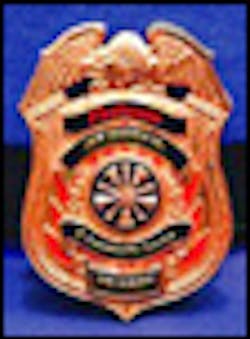Tacoma Engines 2 and 8, Ladder 2 and Medic 2
The driver of the tanker had taken shelter in a storage shed not far from the fire. That meant several rescuers had to go very close to two large fixed propane tanks to retrieve him.
For their response to what has since been called one of the most significant emergency responses in the history of the Tacoma Fire Department, 12 members are being honored with Firehouse Heroism awards.
It was October 6, 2007, and there were reports of a major propane gas release, fire and explosions at the Altlas Foundry in Tacoma, Wash.
The crew of Engine 2 was the first on the scene. They were returning to their station from a previous run when they noticed a large column of black smoke in the air. When they got to the scene, they found an 8,000-gallon tanker truck on fire. The truck was burning next to two large propane tanks -- one 18,000 gallons, the other 25,000 gallons.
Lieutenant Chris Perry surveyed the scene and sensed an explosion was imminent. He radioed a warning to responding crews telling them so, and directed his driver to move the engine to a safer location.
As firefighters prepared to set up the first water stream, the tanker truck exploded, sending debris in all directions, just as Perry had warned that it would. His actions likely saved the lives of his fellow firefighters.
Among them, Battalion Chief Mike Mitchell and his crew, who saw the blast as they approached the scene.
"My immediate thought was, what was the extent of the damage," he says. "There's a lot of things going through your mind."
Mitchell, who assumed command of the incident, had 70 firefighters to lead and keep safe as best he could. He also had the lives of whoever happened to be nearby to think of. He made the decision to evacuate all civilians within a half mile in all directions surrounding the incident.
"I didn't know how many people were currently working. My thought process was to make sure nobody entered the area."
The situation was highly volatile. When the tanker truck exploded, it ruptured an underground natural gas line. The blast also destroyed power lines and sparked a few smaller fires in grassy areas. Moreover, there were five plant employees who needed immediate medical attention.
Mitchell knew that, in battling the blaze, his firefighters were putting themselves at serious risk. To put out the fires and make the areas safe, they had to work in close proximity to "hot zones" -- areas that could explode or burst into flames at any minute.
The driver of the tanker had taken shelter in a storage shed not far from the fire. That meant Captain Bill Colwell, Lieutenant Chris Brink, Firefighters Buck Copsey, Jeff Carney, Joe Van Meter, Rick Stevens, Firefighter-Paramedics Randy Eichholtz, Frank Scratch, and Firefighters Nancy Ubben and Firefighter Kurt Schiefferdecker had to go very close to two large fixed propane tanks to retrieve him. Without hesitation, they cut their way through two chain link fences and crossed the extremely dangerous area near the still burning propane tanks to extricate the driver.
Although, sadly, the driver later died, Mitchell said the response that went very well.
"They did that at a lot of risk to themselves," he said of the firefighters who responded that day. "They did an extraordinary job."
